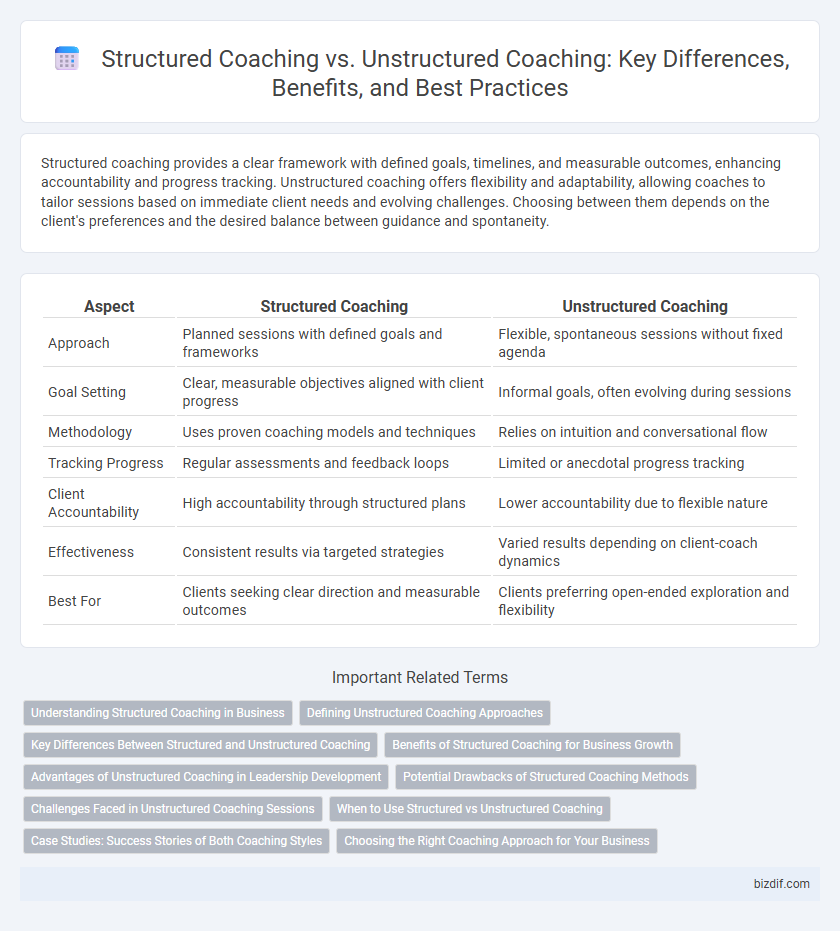Structured coaching provides a clear framework with defined goals, timelines, and measurable outcomes, enhancing accountability and progress tracking. Unstructured coaching offers flexibility and adaptability, allowing coaches to tailor sessions based on immediate client needs and evolving challenges. Choosing between them depends on the client's preferences and the desired balance between guidance and spontaneity.
Table of Comparison
| Aspect | Structured Coaching | Unstructured Coaching |
|---|---|---|
| Approach | Planned sessions with defined goals and frameworks | Flexible, spontaneous sessions without fixed agenda |
| Goal Setting | Clear, measurable objectives aligned with client progress | Informal goals, often evolving during sessions |
| Methodology | Uses proven coaching models and techniques | Relies on intuition and conversational flow |
| Tracking Progress | Regular assessments and feedback loops | Limited or anecdotal progress tracking |
| Client Accountability | High accountability through structured plans | Lower accountability due to flexible nature |
| Effectiveness | Consistent results via targeted strategies | Varied results depending on client-coach dynamics |
| Best For | Clients seeking clear direction and measurable outcomes | Clients preferring open-ended exploration and flexibility |
Understanding Structured Coaching in Business
Structured coaching in business involves a systematic approach with clearly defined goals, timelines, and measurable outcomes, ensuring consistent progress and accountability. This method leverages formal frameworks, such as competency models and performance metrics, to align coaching activities with organizational objectives. By providing a predictable and repeatable process, structured coaching enhances skill development, employee engagement, and overall business performance.
Defining Unstructured Coaching Approaches
Unstructured coaching approaches emphasize flexibility and adaptability, allowing coaches to tailor sessions in real time based on the coachee's immediate needs and responses. This method prioritizes open-ended dialogue, intuitive questioning, and reflective listening over predefined agendas or rigid frameworks. Such approaches foster organic growth and self-discovery by encouraging spontaneous exploration rather than following a set curriculum.
Key Differences Between Structured and Unstructured Coaching
Structured coaching features defined goals, consistent sessions, and measurable outcomes, ensuring systematic progress and accountability. Unstructured coaching is more flexible, adapting to the coachee's immediate needs without a fixed agenda or timeline, fostering spontaneity and personalized exploration. The key difference lies in structure and predictability, where structured coaching emphasizes planning and evaluation, while unstructured coaching prioritizes adaptability and fluidity.
Benefits of Structured Coaching for Business Growth
Structured coaching provides a systematic framework that enhances goal setting, progress tracking, and accountability, driving measurable business growth. It leverages data-driven insights and tailored strategies to optimize employee performance and align individual objectives with organizational goals. Consistent implementation of structured coaching reduces skill gaps, improves leadership development, and accelerates productivity improvements across the company.
Advantages of Unstructured Coaching in Leadership Development
Unstructured coaching in leadership development fosters organic growth by allowing leaders to explore challenges in a flexible, adaptive environment, promoting creativity and authentic problem-solving. This approach encourages open dialogue and self-reflection, leading to deeper insights and personalized learning experiences. Leaders benefit from the freedom to address immediate, real-time issues without the constraints of rigid frameworks, enhancing agility and emotional intelligence.
Potential Drawbacks of Structured Coaching Methods
Structured coaching methods may limit creativity and flexibility by adhering strictly to predefined frameworks and goals, potentially overlooking the unique needs and learning styles of individual coachees. These rigid approaches can stifle spontaneous problem-solving and reduce opportunities for personalized, adaptive growth. Organizations relying solely on structured coaching risk diminishing engagement and long-term development outcomes due to lack of customization.
Challenges Faced in Unstructured Coaching Sessions
Unstructured coaching sessions often face challenges such as lack of clear objectives, inconsistent progress tracking, and difficulty aligning coaching outcomes with organizational goals. The absence of a defined framework can lead to miscommunication between coach and coachee, resulting in reduced engagement and limited skill development. These hurdles hinder the ability to measure effectiveness and scale coaching efforts across teams or departments.
When to Use Structured vs Unstructured Coaching
Structured coaching is ideal for situations requiring clear goals, measurable outcomes, and time-bound progress, such as skill development or performance improvement in a corporate setting. Unstructured coaching excels in exploratory scenarios where creativity, personal growth, or complex problem-solving are emphasized, allowing for flexibility and adaptability in sessions. Choosing between these methods depends on the client's needs, with structured coaching suited for targeted results and unstructured coaching fostering deeper self-awareness and innovation.
Case Studies: Success Stories of Both Coaching Styles
Case studies reveal that structured coaching, with its clear frameworks and measurable goals, drives consistent performance improvements and skill development in corporate and athletic settings. In contrast, unstructured coaching fosters creativity and adaptability by allowing personalized, flexible sessions tailored to individual needs, often seen in entrepreneurial and artistic environments. Success in both styles hinges on aligning coaching methods with client objectives, demonstrating that the effectiveness of structured versus unstructured approaches depends largely on context and desired outcomes.
Choosing the Right Coaching Approach for Your Business
Structured coaching provides a clear framework with defined goals, timelines, and outcomes, ideal for businesses seeking measurable progress and accountability. Unstructured coaching offers flexibility and adaptability, allowing for personalized exploration and creative problem-solving in dynamic environments. Selecting the right approach depends on your business's specific needs, culture, and desired results to maximize employee development and organizational growth.
Structured Coaching vs Unstructured Coaching Infographic

 bizdif.com
bizdif.com